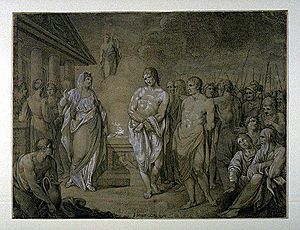Iphigenia facts for kids
In Greek mythology, Iphigenia was a princess of Argos. She was the daughter of King Agamemnon and Queen Clytemnestra. Her name, "Iphigenia," means "strong-born" or "she who causes the birth of strong offspring."
Iphigenia is famous for a difficult story involving her father and the goddess Artemis. In this myth, King Agamemnon upset Artemis. To make up for this, Artemis demanded that Agamemnon sacrifice Iphigenia. This sacrifice was needed so his ships could sail to Troy for the Trojan War.
Contents
The Difficult Choice
King Agamemnon was preparing his ships to sail to Troy. But the winds stopped blowing, trapping his fleet. The prophet Calchas explained that the goddess Artemis was angry with Agamemnon. To calm her, Agamemnon had to sacrifice his own daughter, Iphigenia. This was a terrible choice for a father.
Her Fate: Sacrifice or Rescue?
There are different versions of Iphigenia's story:
The Sacrifice at Aulis
In some versions, Iphigenia was indeed sacrificed at a place called Aulis. This sad event allowed the winds to blow again. Agamemnon's ships could then finally sail to Troy. This version highlights the harsh demands of the gods in ancient myths.
Artemis's Rescue
In other, more hopeful versions, Artemis saved Iphigenia at the last moment. Just as the sacrifice was about to happen, Artemis replaced Iphigenia with a deer or another animal. She then took Iphigenia away in a cloud.
Life as a Priestess
After her rescue, Iphigenia was taken to a faraway land called Tauris. There, she became a priestess in Artemis's temple. Her job was to perform rituals for the goddess. Years later, her brother Orestes arrived in Tauris. He was on a quest and did not know his sister was alive. Iphigenia and Orestes recognized each other. They then planned their escape from Tauris together.
Iphigenia's story shows the power of the gods and the difficult choices heroes faced in Greek myths. It also shows themes of family, duty, and survival.
Images for kids
-
François Perrier's The Sacrifice of Iphigenia (17th century), depicting Agamemnon's sacrifice of his daughter Iphigenia
-
The Sacrifice of Iphigenia (1757) by Giovanni Battista Tiepolo
-
Iphigenia in Tauris (1893) by Valentin Serov
-
Iphigenie (1862) by Anselm Feuerbach
See also
 In Spanish: Ifigenia para niños
In Spanish: Ifigenia para niños
 | Frances Mary Albrier |
 | Whitney Young |
 | Muhammad Ali |









